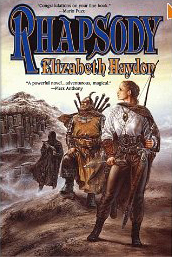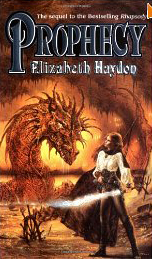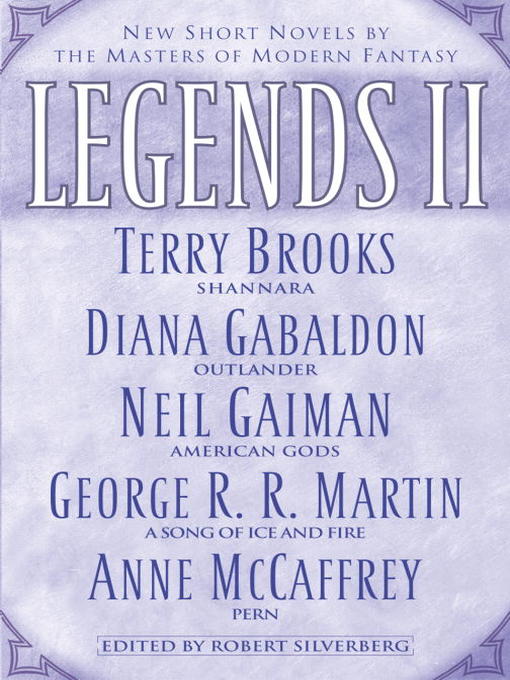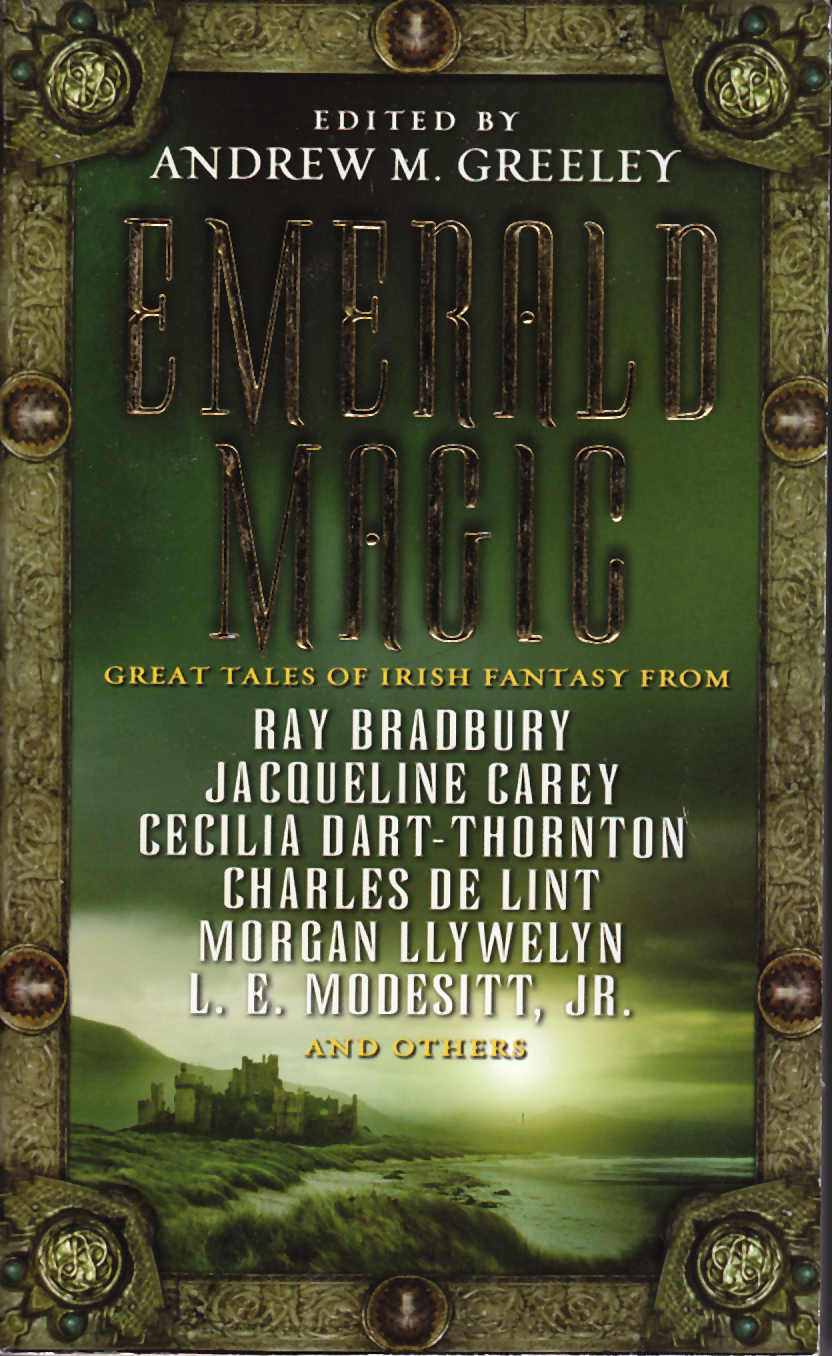Elizabeth Haydon
Books: Fantasy
Rhapsody (2000), Prophecy (2001), Destiny (2002)
Anthologies
Legends II (2004), Emerald Magic (2004)
Rhapsody: Child of Blood (1999)
 I read this series (Rhapsody is book one) several years ago, and remembered enjoying it, but never re-read it, primarily because Rhapsody is 656 pages, and the remaining books in the series are just as long or longer. It's one thing to start a 400 page book. It's something else entirely to start a book that will lead to a minimum of 1800 pages of reading. High fantasy is interesting, but it's always forever to read.
I read this series (Rhapsody is book one) several years ago, and remembered enjoying it, but never re-read it, primarily because Rhapsody is 656 pages, and the remaining books in the series are just as long or longer. It's one thing to start a 400 page book. It's something else entirely to start a book that will lead to a minimum of 1800 pages of reading. High fantasy is interesting, but it's always forever to read.
Rhapsody starts out with Meridion, a Time Editor who is attempting to change the past, to save the world from destruction. Meridion is both viewing and interfering, watching the past, looking for hints, and even moving individuals about in time.
Rhapsody is a half-Lirin singer and a namer--a woman escaping her past. By sheer accident, she runs into two half Bolg--monstrous humanoids who are also escaping their own problems. These two Bolg become her companions--and eventually her friends.
I have to admit that although I don't dislike Rhapsody, I like Grunthor and Achmed better. I love how two monsters become my favorite characters--how they became two of the most interesting characters in the story. Although Achmed is cranky and irritable and snide--traits I quite enjoy--there is something about Grunthor I especially love. Physically, he's described as a horrible monster that you expect to be dim-witted, but he isn't stupid. He's not as intelligent as Achmed, but he as the knowledge and wits to survive and thrive.
In other words, Grunthor and Achmed are my favorite characters, and it's worth re-reading the story just to get to know them again.
Although Grunthor and Achmed are main characters, they are not the primary focus of the story. The primary focus is Rhapsody. She is interesting and complex, but I didn't find her as fascinating as the Bolg.
But the strongest part of the book is the dialog between Rhapsody, Achmed, and Grunthor.
With a violent lurch Rhapsody sat up; then she recoiled and belted him in the eye. It was a beautiful shot, innately aimed, with her entire weight behind it, and carried with it the inpact of a blow from a man twice her size. Grunthor feel back on his rump with a thud.
Achmed chuckled. "See what bring a considerate fellow buys you?"
Rhapsody, now awake, blinked back the tears and stumbled over to the giant, who was gingerly touching his eye as it began to swell.
"Gods Grunthor, I'm sorry," she gasped. "I didn't know it was you."
The Bolg looked up at her and grimaced with an expression that might, under different circumstances, have been a smile.
"That's all right miss. Quite a nice right cross you got there. Where'd you learn it?"
"My brothers."
"Oi see. Well, Oi guess since we adopted you, perhaps you would do me the favor of thinkin' o' me as one o' your brothers, and don't 'it me with that lovely right cross again, eh?"
A hint of a smile crossed her face as she dabbed her eye. "Who do you think I used it on the most?"
To be honest, I think I would have preferred more dialog between the three of them, and less of the detailed description of everything that comes with high fantasy.
If you enjoy high fantasy, then I recommend Rhapsody. If you're not into high fantasy, then you'll probably want to avoid Rhapsody.
Rating: 7/10
Prophecy (2001)
 The sequel to Rhapsody, this story was good enough that I broke my own rule of reading ahead, because I just HAD to know whether things worked out in this book or not and I had a very difficult time putting down the book every night to go to bed. What surprised me is that this is most definitely "a kissing book" that I would definitely rate as PG-13 for sex.
The sequel to Rhapsody, this story was good enough that I broke my own rule of reading ahead, because I just HAD to know whether things worked out in this book or not and I had a very difficult time putting down the book every night to go to bed. What surprised me is that this is most definitely "a kissing book" that I would definitely rate as PG-13 for sex.
Certain things brought up in the first book are cleared up which was a relief, and there are some significant deaths, which was not a good thing, but then I do hate books were no one dies, because I find it unreal, so I suppose I just have to suck up when characters die.
One thing that bothered me is that there were long passages and quotes from the first book, assumedly to bring people who had not read the first book, up to speed, or to remind people who had read the first book a year (or more) ago, of what had happened. Since I read this book immediately after reading Rhapsody I found that a bit frustrating. Typically since the synopses from previous books are in the beginning of a sequel, I can just skip that and get right onto new material, so this was a bit annoying, since this material is interspersed with the new story, I had to be careful what I skip.
Despite those problems, this was also a good book. There was a less of Gunthor and Achmed, which is too bad, because I really like those characters, but they were not completely shunted aside for the mushy bits, so that was good.
Prophecy ended with some resolution of the plot that continued through the story, but not enough that I would not have been irritated to wait a couple of years for the next book.
Rating: 6/10
Destiny (2002) 
After reading Rhapsody and Prophecy I wanted to finish re-reading the series and the story, but I just wasn’t thrilled about reading more about Rhapsody. So I put Destiny in my pocket as my waiting and transportation book. Unfortunately, an 850 page book is large and unwieldy, and after almost two months of lugging it around, I decided to just bite the bullet and finish reading the damned thing.
Which pretty much sums up my feeling for the last two books of this series: I just wanted to finish the damned thing.
The frustrating thing is that I really like the tale, and I love Achmed and Grunthor. Unfortunately, Rhapsody herself started to grate on my nerves somewhere in the second book, and by the third book I found myself skimming the long passages that were solely about her and how wonderful and self-sacrificing and beautiful and perfect she was. Yes, she had lots of horrible things happen to her, but I just didn’t find her interesting the way I found Achmed and Grunthor interesting. Especially Achmed. He managed to remain both an enigma and a bastard throughout the series, and as such as completely fascinating. I wanted to know more about his powers and his background but instead continued to get tiny hints about his past and large amounts of Rhapsody and Ashe pining for each other.
Whatever.
So as much as I liked the tale and the world building and secondary characters, I would have enjoyed the story much more if it had been told from Achmed or Grunthors point of view.
I also would have preferred it if it had about about 300 pages shorter. There really is such a thing as too much description.
Rating: 5/10
Legends II (2004) edited by Robert Silverberg
 I picked up this book just for the Neil Gaiman Shadow story, so the fact that I found it in the bargain bin means that any stories beyond ‘The Monarch of the Glen’ were an added bonus.
I picked up this book just for the Neil Gaiman Shadow story, so the fact that I found it in the bargain bin means that any stories beyond ‘The Monarch of the Glen’ were an added bonus.
- Homecoming by Robin Hobb
- The Sworn Sword by George R. R. Martin
- The Yazoo Queen by Orson Scott Card
- Lord John and the Succubus by Diana Gabaldon
- The Book of Changes by Robert Silverberg
- The Happiest Dead Boy in the World by Tad Williams
- Beyond Between by Anne McCaffrey
- The Messenger by Raymond E. Feist
- Threshold by Elizabeth Haydon
- Indomitable by Terry Brooks
- The Monarch of the Glen by Neil Gaiman
Besides 'Monarch of the Glen' there were three other stories I read: 'Homecoming' by Robin Hobb, 'The Messenger' by Raymond E. Feist, and 'Threshold' by Elizabeth Haydon. All three stories had the same effect on the that 'Monarch of the Glen' did. I wanted to go back and reread that authors' other books. The Riftwar Saga, the Farseer Trilogy, and the Rhapsody Trilogy.
Publisher: Del Rey
Emerald Magic (2004) edited by Andrew M. Greeley
 This book first caught my eye because I didn't expect to see Andrew Greeley's name in the fantasy section. Then I looked at the list of authors who wrote in this anthology: Charles de Lint, Diane Duane, Elizabeth Haydon, Morgan Llywelyn, Judith Tarr, Peter Tremayne, Jane Yolen. Even one of those names would have been enough inducement for me to pick up the book--but all those? And more!
This book first caught my eye because I didn't expect to see Andrew Greeley's name in the fantasy section. Then I looked at the list of authors who wrote in this anthology: Charles de Lint, Diane Duane, Elizabeth Haydon, Morgan Llywelyn, Judith Tarr, Peter Tremayne, Jane Yolen. Even one of those names would have been enough inducement for me to pick up the book--but all those? And more!
Irish mythology, folktales, and fantasy. What more could I want?
Every story I read was excellent, although I did skip L.E. Modesitt Jr's science fiction story (I am rarely in the mood for science fiction.)
- Herself by Diane Duane
- Speir-Bhan by Tanith Lee
- Troubles by Jane Yolen and Adam Stemple
- The Hermit and the Sidhe by Judith Tarr
- The Merrow by Elizabeth Haydon
- The Butter Spirit's Tithe by Charles de Lint
- Banshee by Ray Bardbury
- Peace in Heaven by Andrew Greeley
- The Lady in Grey by Jane Lindskold
- A Drop of Something Special in the Blood by Fred Saberhagen
- For the Blood Is the Life by Peter Tremayne
- Long the Clouds Are Over Me Tonight by Cecilia Dart-Thornton
- The Swan Pilot by L.E. Modesitt, Jr
- The Isle of Women by Jacqueline Carey
- The Cat with No Name by Morgan Llywelyn
I loved Elizabeth Haydon's The Merrow. It's the story of a mermaid marriage to a human, and even talks of the old tales where a sailor or fisherman hides a mermaid's item of power to keep the mermaid in her human form--and keep her as his wife. The tale is set during the Irish potato blight, as one town is trying to survive and concludes that traveling to America is the only way they'll survive.
This is an anthology that I will come back and read again, so if you're wondering whether you should make the purchase, my recommendation if definitely YES!
Publisher: Tor
Rating: 8/10
